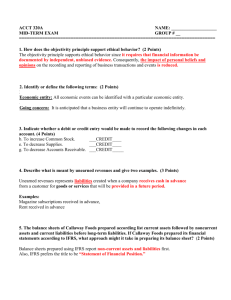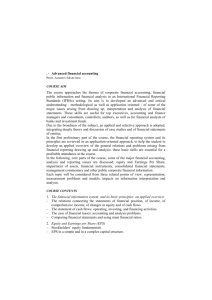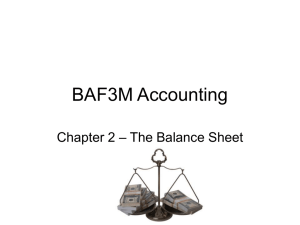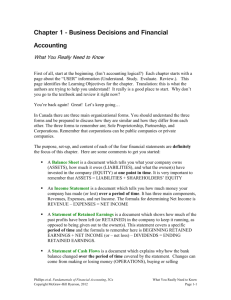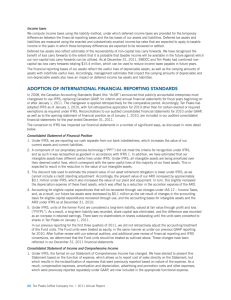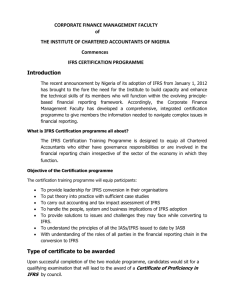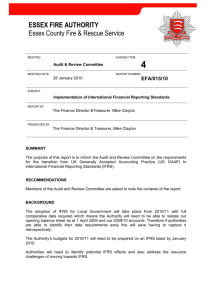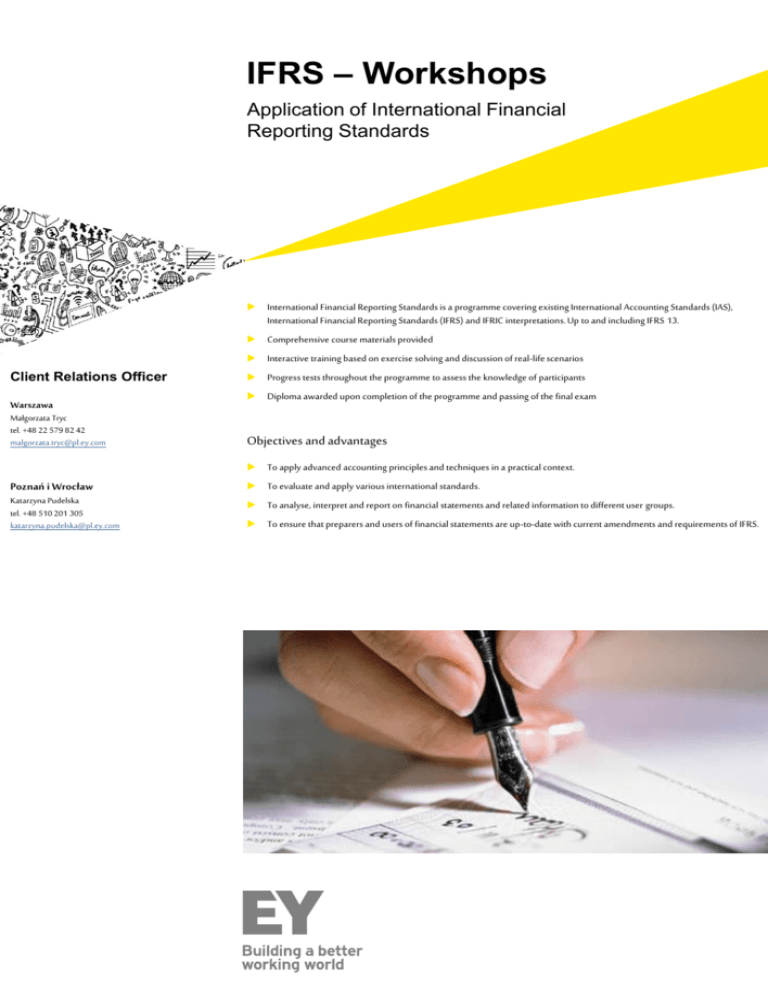
IFRS – Workshops
Application of International Financial
Reporting Standards
Client Relations Officer
Warszawa
Małgorzata Tryc
tel. +48 22 579 82 42
malgorzata.tryc@pl.ey.com
Poznań i Wrocław
Katarzyna Pudelska
tel. +48 510 201 305
katarzyna.pudelska@pl.ey.com
International Financial Reporting Standards is a programme covering existing International Accounting Standards (IAS),
International Financial Reporting Standards (IFRS) and IFRIC interpretations. Up to and including IFRS 13.
Comprehensive course materials provided
Interactive training based on exercise solving and discussion of real-life scenarios
Progress tests throughout the programme to assess the knowledge of participants
Diploma awarded upon completion of the programme and passing of the final exam
Objectives and advantages
To apply advanced accounting principles and techniques in a practical context.
To evaluate and apply various international standards.
To analyse, interpret and report on financial statements and related information to different user groups.
To ensure that preparers and users of financial statements are up-to-date with current amendments and requirements of IFRS.
Who are the workshop for?
Materials
Accountants, chief accountants, controllers and finance
managers who would like to understand, interpret and apply
IFRS. The course assumes knowledge of basic accounting
procedures and double entry bookkeeping. No prior
knowledge of accounting standards is required.
Participants receive comprehensive course notes in Polish,
which include a theoretical component summarizing the key
elements of IFRS as well as practical tests and solutions.
It is also possible (only for course participants) to purchase
the training materials in English at additional cost.
Structure
The course is composed of a mixture of lectures, question and
answer sessions, practical exercises and illustrations as well as
home study.
The programme is divided into six modules, each consisting
of two days of training with about three weeks’ break
between the course days. During the time between courses
participants are expected to study at home in their own time
and solve tests. Tests are marked by the EY Academy of
Business team and sent back to participants together with the
solutions.
An e-mail hot line is available to facilitate contact with the
tutor if any problems or questions regarding homework
assignments should arise.
It is possible to participate in selected modules only.
200 zł + 23% VAT - the cost of materials to the whole
programme
or
80 zł + 23% VAT – the cost of the materials for half of
the modules
Egzamination
The programme finishes with a two and a half hour written
examination. After passing the exam with a positive result (at
least 50% of the total marks), those students who have
attended the whole course receive an EY Academy of
Business diploma.
The examination will cover only the topics discussed at the
course.
Programme – module I
Day 1
Day 2
Introduction to International Financial Reporting
Standards (IFRS)
Property, Plant and Equipment
Basic historical background to financial reporting and accounting internationally.
Structure of the International Accounting Standards Board including current
developments and discussion of the work of the International Financial Reporting
Interpretations Committee.
Role of International Financial Reporting Standards in European Union countries and
the United States.
The Standard Setting process.
IFRS Conceptual Framework with emphasis on basic accounting concepts and the
definitions of assets, liabilities, revenue, costs and equity.
Presentation of Financial Statements
Measurement at recognition: costs to be capitalized at initial recognition (purchase price,
production cost, costs of removing the asset at the end of its useful economic life).
Definition of depreciable amount; various depreciation methods: straight-line,
diminishing balance, sum of digits, units of production.
Component accounting.
Measurement after recognition: cost model and revaluation model.
Accounting for revaluations and disposals of non current assets.
Changes in depreciation methods and revisions of useful life.
Presentation and disclosure of non current assets.
Borrowing Costs (loans, credits)
Definition of borrowing costs
Accounting treatment of borrowing costs under the revised IAS 23
Key issues related to capitalization: qualifying assets, capitalization period and
capitalization rate.
The current format of financial statements.
The operating cycle relevant to specific business activities and the classification of assets
and liabilities into current/non current.
Minimum requirements regarding the presentation of items in the income
statement/statement of comprehensive income and statement of financial
position/balance sheet; presentation of illustrative formats.
Government Grants and Disclosure of Government Assistance
Statement of changes in equity.
Grants related to income and grants related to assets.
Interim reporting.
Discussion of the two methods of accounting for government grants recommended
under IAS 20.
Inventories
Measurement at recognition: purchase price, cost of conversion, other costs included in
the valuation of inventory.
Net realizable value – definition and practical examples of valuation.
Standard costing and retail methods.
Various methods of apportioning costs to units: FIFO and weighted average.
Revenue Recognition
Basic revenue categories: from sale of goods, provision of services, interest, royalties and
dividends.
Conditions for revenue recognition.
Fair value measurement: discussion of the need for discounting future cash flows when
revenue is to be received in the future; accounting for discounted revenue.
Investment Properties
Definition and measurement at recognition of investment properties.
Criteria for classification as investment property; reclassification rules.
Valuation methods: cost model and fair value model; conditions for applying the fair
value model, accounting for changes in fair value.
Events after the Reporting Date
Defining the period during which events after the reporting date arise.
Adjusting and non-adjusting events – practical examples and accounting treatment.
Accounting Policies, Changes in Accounting Estimates and Errors
Hierarchy of sources for choosing accounting policies.
Definition of past period errors and the accounting treatment applied to correction of
errors.
Accounting estimates and their changes.
Programme – module II
Day 1
Day 2
Leases
Introduction to Group Accounting
Leasing agreements in the light of the substance over form principle.
Categories of leases and their impact on the financial statements of the lessor and the
lessee.
Methods of accounting for investments in individual company accounts and their
impact on consolidated financial statements.
When to use the various methods of consolidation.
Definitions of a subsidiary, associate, joint venture, control, joint-control, significant
influence and other definitions relating to group accounting.
Step by step guide to identifying whether a lease is finance or operating and the
accounting entries required.
Methods of splitting payments under finance lease into interest and capital components
including the sum of the digits and the actuarial methods.
Accounting for sale and leaseback transactions.
Disclosure requirements.
Substance over form
Most common issues requiring analysis of economic substance: sale and repurchase
agreements, consignment sales, factoring of receivables, securitization of assets.
Construction Contracts
Consolidated Statement of Financial Position and Statement of
Comprehensive Income
Step by step guide to the preparation of the consolidated statement of financial position
based on discussion of examples.
Goodwill and gain on bargain purchase.
Impairment of goodwill
Revaluation of the assets and liabilities of a subsidiary to fair value.
Non-controlling interests in the statement of financial position.
Consolidation adjustments eliminating:
The nature of revenue and costs arising on long term contracts.
equity and investments,
Methods of recognizing revenue and costs in the income statement/statement of
comprehensive income: completed contract and stage of completion.
intra-group balances (trade, loans),
Practical guidelines on the choice of method for measuring the stage of completion.
unrealized profit on intra-group transactions arising from the transfer of inventory
and non-current assets (including the impact on depreciation),
Treatment of loss generating contracts.
Dividends.
Presentation of construction contracts in the balance sheet/statement of financial
position.
Step by step guide to the preparation of the consolidated statement of comprehensive
income based on discussion of examples.
Disclosure and presentation requirements for long term contracts.
Eliminating intra-group transactions from the perspective of the statement of
comprehensive income (sales, cost of sales, dividends).
The impact of transactions on non-controlling interests.
Related Party Transactions
Definition of related parties and the need to disclose transactions and balances with
related parties.
Types of transactions requiring disclosure; discussion of required level of detail of
disclosures.
Programme – module III
Day 1
Day 2
Statement of Cash Flows
Impairment of Assets
The need for a statement of cash flows and how it is prepared from information
contained in the income statement/statement of comprehensive income, balance
sheet/statement of financial position and notes to the financial statements.
Definition of cash and cash equivalents; examples of items classified as both of the
above.
The indirect and direct methods of constructing the cash flow statement.
Identifying external and internal impairment indicators.
Measuring recoverable amount and identifying situations in which an impairment loss
needs to be recorded.
Value in use under IAS 36 and how to calculate it.
Identifying cash generating units (CGUs); allocating impairment losses to specific assets
in a CGU.
Reversal of impairment losses.
Provisions, Contingent Liabilities and Contingent Assets
Definitions of provisions, contingent liabilities and contingent assets
Obligating events: legal and constructive obligations
Provisions for future operating losses and onerous contracts.
Discussion of definitions.
Measurement rules: defining the expenditure required to settle the obligation,
discounting and unwinding of the discount.
Conditions for recognition of intangible assets: identifiability, control, future economic
benefits, reliable measurement.
Conditions for recognizing provisions for restructuring expenses.
Intangible assets identified in business combinations.
Treatment of research and development costs.
Discussion of criteria for recognition in the statement of financial position or in the notes
to the financial statements.
Treatment of goodwill
Deferred Taxation
Identifying taxable and deductible temporary differences.
Tax base of assets and liabilities.
Accounting for deferred tax assets and liabilities using the liability method.
Measurement and presentation of deferred tax assets.
Deferred tax balances.
Deferred taxation in consolidated financial statements.
Intangible Assets
First time adoption of international standards
The scope of IFRS 1 – definition of entities applying international standards for the first
time
Rules relating to first time adoption of IFRS: defining the reporting date and the date of
transition to IFRS, applying compulsory and voluntary exemptions, impact on
comparatives.
Programme – module IV
Day 1
Earnings per Share
IFRS 11 Joint Arrangements
Factors that influence the classification of joint arrangements: legal form, contractual
arrangements and other.
Methods of calculating basic and diluted earnings per share.
Accounting for joint operations and joint ventures
Impact of issue of shares at full market price, share splits, bonus issues and rights issues
on the weighted average number of shares and comparatives.
Numerical examples illustrating the principles
Treatment of potential ordinary shares: options, convertible preference shares,
convertible loans and convertible debentures.
Determining the order in which potential dilutive factors are included in the calculation
of the weighted average number of shares.
Earnings per share for continuing operations.
Segment Reporting
The necessity for segment reporting.
Definition of operating segment and Chief Operating Decision Maker.
Discussion on the criteria for presentation of separate segments.
Inter-segment transactions.
Discussion on the changes required by IFRS 8: Operating segments.
Business combinations
Discussion of how the revised FRS 3 has changed consolidation/group accounting.
Discussion of basic issues described in IFRS 10: new definition of control, potential
voting rights, de facto control, identification of relevant activities, protective rights,
continuous assessment.
Deferred and contingent consideration.
Re-measurement of assets, liabilities and contingent liabilities at fair value. Impact of
remeasurement on the date of acquisition in the consolidated statement of financial
position – fair value adjustments in subsequent years.
IFRS 12 Disclosure of Interests in Other Entities
The purpose and scope of disclosures
Disclosures required for significant interests in subsidiaries, joint arrangements and
associates
Other disclosures
Non-current Assets Held for Sale and Discontinued Operations
Non-current assets held for sale – classification criteria.
Measurement of non-current assets held for sale at the date of classification.
Accounting for disposal groups.
Changes in Foreign Exchange Rates and Consolidation of Foreign Subsidiaries
Discussion of when discontinued operations arise and the disclosure requirements in
IFRS 5.
Functional and presentation currencies.
Criteria considered in selecting the functional currency.
Accounting for foreign currency transactions on initial recognition, settlement and
balance sheet dates.
Recognition of exchange differences.
Translating the results and financial position of foreign subsidiaries included in the
consolidated accounts.
Rules for applying foreign exchange rates to assets, liabilities, equity, income and costs.
Recognition of exchange differences in consolidated financial statements: share of group
and non-controlling interests.
Elimination of balances and transactions with a foreign entity.
Translation of goodwill.
Accounting for discontinued operations in comparatives.
Day 2
The Equity Method
Accounting for associates in the standalone and consolidated financial statements.
Discussion, based on an example, of the treatment of an investment in the statement of
financial position and statement of comprehensive income under the equity method.
Elimination of unrealized profits from transactions between investor and associate.
Goodwill and gain on bargain purchase.
Financial Reporting in Hyperinflationary Economies
Criteria considered in assessing whether hyperinflation exists.
Financial statement items subject to adjustments due to hyperinflation.
Programme – module V
Day 1
Day 2
Financial Instruments: IAS 32 – Presentation,
IAS 39 – Recognition and Measurement,
IFRS 7 – Disclosure, IFRS 9.
Group Statements of Cash Flows
Discussion of the various classes of financial instruments, such as: financial assets and
financial liabilities at fair value through profit or loss, loans and receivables, held-tomaturity investments, available-for-sale financial assets and other liabilities.
Recognition of gains and losses on the measurement of each class of financial
instruments.
Measurement of financial assets and liabilities under the amortized cost method.
Calculation of the effective interest rate. Measurement of fixed and variable interest
instruments on the date of interest payment.
Dealing with the various issues that arise on preparation of group statements of cash
flows such as investments in associates, dividends paid to non-controlling interests and
the acquisition and disposal of subsidiaries during the period.
Preparing the consolidated statement of cash lows using the indirect method on the
basis of information from the consolidated statement of financial position, statement of
comprehensive income and notes to the financial statements.
More complex consolidation techniques
The impact of piecemeal acquisitions on goodwill calculation.
Accounting for disposals of all or part of a subsidiary: calculating the consolidated profit
on disposal; accounting for disposals resulting in a reduction of the shareholding, where
a controlling interest remains, an associate or investment remains.
Consolidation of groups, in which control is exercised indirectly – vertical and mixed
groups.
Classification as equity and liabilities. Compound financial instruments – debentures
convertible to shares.
Rules for recognizing impairment losses under IAS 39. Impairment of assets carried at
amortized cost and available-for-sale.
Derivative instruments, with emphasis on forwards, futures and options.
Measurement and accounting for derivative foreign exchange contracts classified as
held-for-trading.
Piecemeal acquisition under IFRS 10.
The issues with acquiring and losing control.
Contracts hedging fair value and future cash flows. Definition and examples of fair value
and cash flow hedges. Formal conditions for using hedge accounting. Identifying the
hedged item and hedging instrument. Accounting treatment.
Group reorganisations including discussion on transactions between entities under
common control
Embedded derivatives: definition, identification, separation and accounting treatment.
Disclosures required under IFRS 7
Discussion on the current status of IFRS 9.
Programme – module VI
Day 1
Dzień 2 (B)
Employee benefits
Revision of the most important issues in order to prepare for the final
examination.
Jubilee and retirement bonuses.
Holiday pay accruals.
The operation of pension schemes.
Defined benefit and defined contribution pension schemes.
Disclosure requirements for employee benefits.
IFRS 13 Fair value measurement
Definition of fair value and related terms.
Principal market and the most advantageous market.
Transaction costs.
Highest and best use.
Valuation techniques.
Share Based Payment
Equity-settled and cash-settled share based payments
Definition of the grant date, vesting period and vesting date.
Accounting for market and non-market vesting conditions.
Impact of modification, cancellation and cancellation with compensation on accounting
for equity-settled arrangements.
Accounting for equity-settled transactions in situations, when the entity or counterparty
have the choice of whether to settle in equity or cash.
Timetable
Warszawa
Warszawa
no. 31
no. 32
Module 1A
17 November 2014
7 May 2015
Module 1B
18 November 2014
8 May 2015
Module 2A
18 December 2014
9 June 2015
Module 2B
19 December 2014
10 June 2015
Module 3A
17 February 2015
21 September 2015
Module 3B
18 February 2015
22 September 2015
Module 4A
18 March 2015
13 October 2015
Module 4B
19 March 2015
14 October 2015
Module 5A
21 April 2015
19 November 2015
Module 5B
22 April 2015
20 November 2015
Module 6A
21 May 2015
16 December 2015
Revision
22 May 2015
17 December 2015
Exam
8 June 2015
January 2016
Poznań
Wrocław
no. 13
no. 13
Module 1A
13 May 2015
Autumn 2015
Module 1B
14 May 2015
Module 2A
17 June 2015
Moduł 2B
18 June 2015
Module 3A
14 September 2015
Module 3B
15 September 2015
Module 4A
20 October 2015
Module 4B
21 October 2015
Module 5A
16 November 2015
Module 5B
17 November 2015
Module 6A
7 December 2015
Revision
8 December 2015
Exam
18 December 2015
The courses run from
9 am to 5 pm.
Two breaks for coffee and snacks are
scheduled during the day and at
1 pm participants are invited to lunch
(included in the price).
All dates will be confirmed before the start
of the course.
In exceptional circumstances students
may participate in a missed module with
another group. In order to do that, we
kindly ask to contact our client relations
officer, at least 7 days before the course.
Costs
How to apply?
Information
Each module consisting of two full training days
costs PLN 1,700 + 23% VAT. For those wishing to
complete the full course and paying for the whole
programme upfront, the cost is PLN 9,100 +23%
VAT per person.
If you are interested in the IFRS training programme please
complete the attached application form and send it to us by
fax at least one week before the start of the course.
If you would like to receive more detailed information, please
call
+48 22 579 8000 or e-mail us at:
academyofbusiness@pl.ey.com
Information about the full range of our courses is available on
our website at: www.academyofbusiness.pl
Special offer
It is possible to organize “in company” training at a
customer’s individual request.
We offer the whole programme at a discounted
price of PLN 8,100 + 23% VAT per person.
The price includes course participation and materials
for individual home-study. Payment should be made
before commencement of each module on the basis
of a pro-forma invoice. After payment has been
made, each participant will receive an invoice.
Recommendations
Our courses fulfill the requirements of international professional organisations such as ACCA and IIA, relating to the
professional development of their members. In order to complement your knowledge we offer the following courses:
IFRS Update – This training course is addressed to those responsible for preparing and analyzing financial statements
under IFRSs. The course aims to provide an update on recent developments in IFRSs.
The A to Z of Consolidated Financial Statements – the course enables participants to develop skills from a basic level
right up to an understanding of more complex consolidation issues.
Accounting for financial instruments under IFRS – Two-day course that provides knowledge of the principles of
recognition, measurement and presentation of financial instruments in the financial statements of companies reporting
under International Financial Reporting Standards.
Advanced analysis of financial statements – Training focuses on common concerns of preparers and analysts of
financial statements, i.e. areas of financial accounting, which are mostly based on estimates made by the company or
associated with complex and frequently changing rules of recognition and measurement.
Law for managers or what a manager should know before he calls a lawyer/attorney – a series of four one-day
courses aimed at broadening knowledge about the functioning of an enterprise. The participants will learn the practical
aspects of law facilitating their business and private lives.
Process management – Two-module course, which includes two simulation games, aims at improving the effectiveness
and efficiency of the existing business processes.
Application form
Please complete this form and return by fax to: +48 22 579 8001.
All information concerning the programme will be sent by e-mail to the address indicated.
Name and Surname
Job Title
Mailing address (preferably
company address)
Telephone no.
E-mail
Address for invoice including NIP
I learned about the programme from
the press
e-mail
offer sent to the company
website
other source …………………
Module 4
Module 5
I confirm my participation in “Application of IFRS” training programme:
full programme
or a part:
in
Module 1
Warszawa
Module 2
Poznań
Please issue an invoice for the whole programme:
Module 3
Wrocław
YES
Module 6
NO
I would like to order training materials in English at additional cost:
full programme
or a part:
Module 1+2
Module 3+4
Module 5+6
I give my consent for an electronic invoice to be sent to:
No
Yes (e-mail):
Terms and conditions of taking part in Ernst & Young spółka z ograniczoną odpowiedzialnością Academy of Business sp.k. courses:
In order to take part in the course, the above form must be filled out and sent via e-mail to: academyofbusiness@pl.ey.com or by fax: 22 579 80 01.
The payment for the course must be settled at least 5 business days prior to the commencement of the course.
The payment should be settled through a bank transfer. Account details are as follows: HSBC Bank Polska account number (PLN):
61 1280 0003 0000 0031 1251 3031.
Terms and conditions of cancelling participation in Ernst & Young spółka z ograniczoną odpowiedzialnością Academy of Business sp.k. courses:
It is possible to withdraw from the course upon receipt of a written resignation at least 7 days prior to the commencement of the course. If the deadline is missed, the participant must pay the full fee
of the course.
The cancelation of participation in the course does not result in refund of the payment. However, it is possible to replace the participant unable to attend.
Please note that absence at the course training does not provide a basis for reimbursement for training.
Ernst & Young spółka z ograniczoną odpowiedzialnością Academy of Business s.k. reserves the right to cancel or reschedule the training.
In accordance with art. Paragraph 10. 2 of the Act of 18 July 2002 on electronic services (Journal of Laws No. 144, item. 1204), I agree to receive information from Ernst & Young Academy of Business
Ltd., by email to the above given e-mail, information regarding the course as well as information about other training products. I also agree to the processing of my personal data for purposes of
obtaining information from Ernst & Young spółka z ograniczoną odpowiedzialnością Academy of Business sp.k., al. Armii Ludowej 26, 00-609 Warsaw (according to the Law of 29.08.1997. Data
Protection, Coll. Laws of 2002 No. 101, item. 926, as amended). At the same time I declare that I have been informed of my right to appeal an approval, which will result in the immediate termination
of the sending of commercial information.
I hereby declare that I have read and accept the above terms and conditions.
Date and signature
www.academyofbusiness.pl
Company stamp
© EY. All rights reserved.
Ernst & Young spółka z ograniczoną odpowiedzialnością Academy of Business s.k. | al. Armii Ludowej 26 | 00-609 Warszawa
District Court for the City of Warsaw, Economic Dept. XII of the National Court Register; KRS: 0000530201, NIP: 526-26-970-16, Initial capital: 50,000 zł

